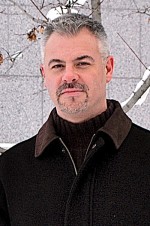Column Name
Title
Kendall Durelle Briggs was born in Salt Lake City and grew up in Seattle. He attended Pacific Lutheran University, where he received a bachelor’s degree in composition, and later went on to study at Juilliard, where he received his master’s and doctoral degrees. He joined the faculty in 1994.
Body
When did you first know you wanted to be a musician and how did you come to know it?
I have always wanted to be a musician. When I was very young, my mother noticed that I would hop up on the piano bench after she’d finished teaching her students and try and play. I began studying piano first with my mother and then with her teacher (and my grandmother’s teacher), Jeannette Wheeler. She was from the old Russian school of playing and had terrible arthritis and could no longer play when I met her. She managed to teach me without ever playing for me. Later, I became interested in the cello. In college I played both, but I had to let the cello go as I couldn’t keep both up as well as I would like.
Who was the teacher or mentor who most inspired you when you were growing up and what did you learn from that person?
Early on, my piano and cello teachers were very important. But it was in my college years that I met my most important teachers. Maurice Skones, conductor of Choir of the West; David Diamond, of course, whom I studied composition with at Juilliard; and also Mary Anthony Cox, with whom I studied harmony. She was a student of [Nadia] Boulanger and we spent many years going through the Dubois Treatise and I learned the art of harmony. With Charles Jones I spent many years studying counterpoint. A remarkable man and teacher.
What was the first recording that you remember hearing or buying? What was its significance to you?
The first recording that made an impression was Heifetz’s Brahms Violin Concerto. I played it to death. I’ll never forget one of the earliest concerts I attended as a child was a performance of Brahms’s First Symphony. I remember tears in my eyes as that great horn solo began the introduction to the fourth movement. Remarkable!
What’s the most embarrassing moment you’ve had as a performer or in your career?
I was playing Rossini’s La passeggiata in Mexico City at the Palace of Fine Arts with Choir of the West, a terribly difficult piano part, when my page turner turned too many pages ahead, and when correcting the mistake turned too many back. I got involved and helped all the while I’m trying to play. Somehow in the mayhem we managed to get to the right page, but not without a few wrong notes, a missed modulation, and glaring stares from the choir and conductor!
If you could have your students visit any place in the world, where would it be, and why?
Bali for sure. The music and its relationship to daily life changes the way you hear melody and rhythm. Florence and Venice, of course, as they are the beginnings of so much of the music we play.
What are your non-music related interests or hobbies? What would people be surprised to know about you?
I love to write poetry, and watercolor. I love musical theater. I have kept a journal for nearly 30 years. It’s very long now, nearly 7,000 typed pages. At 51, I’m only halfway through my life. I’m afraid it will take a few trucks to carry it after I’m gone!
If your students could only remember one thing from your teaching, what would you want it to be?
My love of music. It is a living and breathing companion, shedding light on many of the great mysteries of life. In it is a world without boundaries and borders, and is as infinite as the eternities. If they can find that, they truly have found great joy!
If you weren’t in the career you are in, what would you be doing?
I would be a physician. Music and medicine are great companions. There is healing in both. They both deal with mysteries. They are both riddles and wonders.





